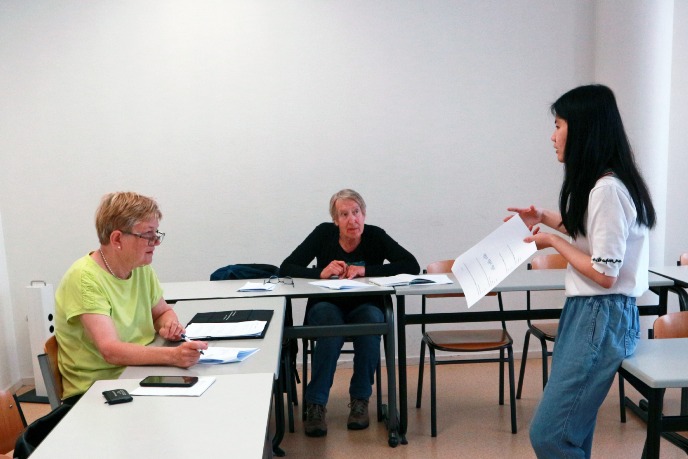UG’s Language Centre uses research into healthy ageing for courses
June saw the kick-off of the first English for Healthy Ageing course at the University of Groningen Language Centre . Recent research has shown that learning a foreign language can delay the development of dementia and Alzheimer’s disease and prevent or reduce feelings of depression in later life. To further research these results, the Bilingualism and Aging Lab ( BALAB ) was founded at the UG. Seyit Gök, department head of the English section of the Language Centre, is a member of BALAB. Observing the positive effects that the language course had on the participants, he decided to bring the research into practice by offering language courses to people aged 60 and above.
Huge impact
‘My idea was to use the Language Centre as an outlet for the research, somewhere we can reconcile theory and practice,’ Seyit says. ‘Not long after I started teaching English classes to older adults as part of one of the BALAB projects, the participants indicated that the course had a very positive effect on their mood. The language course also gave them a personal goal and new social contacts, and they felt connected to society. Even without the official research results, it could already be safely said that the training courses made a huge impact. That’s why I wanted to make language courses for people aged 60 and above available to everyone as soon as possible.’

Racking your brain
The results from the BALAB research are used in the language courses of the Language Centre. One of the results, for example, was that memory games such as Memory work really well for this target group. Tineke Wubs, participant of the English for Healthy Ageing course, said: ‘It feels good to rack my brain again. And, of course, it’s extra fun to notice that I can remember it as well.’ The study is still ongoing, so it’s not clear yet for all techniques what works best for the target group. ‘The courses that we are now giving therefore also provide input for the research. If we notice something interesting during the courses, we pass it on to BALAB so they can study it in further detail’, Seyit says.
New target group
With these courses, the Language Centre addresses a completely new target group. José Briejer, participant of the English for Healthy Ageing course, says that this in particular convinced her to do it. ‘I’ve been thinking about doing a language course for years, but I never went further than following webinars or listening to podcasts to train my brain, because I didn’t really feel comfortable sitting in a classroom with young students. But now, together with people my age, I find it very enjoyable.’
In September and November, the next English for Healthy Ageing courses will start. For now, English is the only language, but perhaps in the future other languages will follow.
| Last modified: | 29 August 2024 10.26 a.m. |
More news
-
24 March 2025
UG 28th in World's Most International Universities 2025 rankings
The University of Groningen has been ranked 28th in the World's Most International Universities 2025 by Times Higher Education. With this, the UG leaves behind institutions such as MIT and Harvard. The 28th place marks an increase of five places: in...
-
05 March 2025
Women in Science
The UG celebrates International Women’s Day with a special photo series: Women in Science.
-
16 December 2024
Jouke de Vries: ‘The University will have to be flexible’
2024 was a festive year for the University of Groningen. In this podcast, Jouke de Vries, the chair of the Executive Board, looks back.
